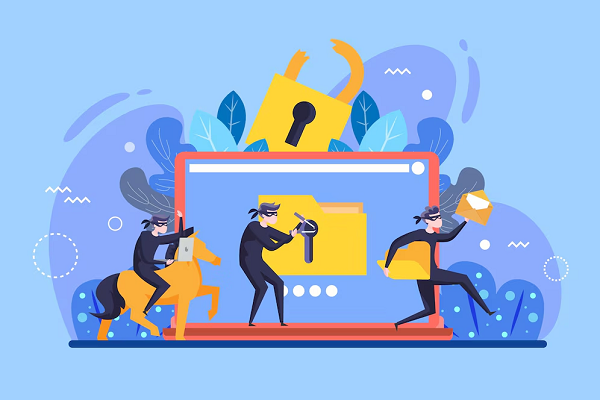Navigating the Digital Maze: Top 10 Cybersecurity Tips for Safe Internet Browsing
The internet matters most in our daily engagements. Cybersecurity is really important. Our personal and professional life is increasingly being pushed online, from social media to online bank transactions. Therefore, now more than ever, the risks posed to our lives mandate that knowledge of how to protect oneself in this digital jungle be an imperative necessity and not just a matter of smartness.

Understanding Cybersecurity
Cybersecurity safeguards a system against cyber assaults, covering hardware, software, and data. Some of the threats that a user might deal with include viruses, malware, ransomware, phishing, forged emails, hostile threats, and much more. The consequence of these attacks varies from downtimes to insignificant losses, to losing customers due to a lack of trust.
A similar one of the main reports shows that the threats have increased by over 300% in the last twelve months. It means that more needs to be done to prevent cyber threats. Phishing threats as the most common entrance gain 250%. It shows thieves are getting good at tricking the target to steal information from various companies. On the other hand, ransomware has also increased, and the calculated loss will exceed 20 billion before the end of the year.

Top 10 Cybersecurity Tips
Use Strong, Unique Passwords
Your primary defence, against entry is a distinctive password. Steer clear of to guess passwords such, as "password" or "123456." Instead opt for a mix of letters, numbers and symbols. Furthermore, employ a password for each account to avoid multiple accounts being jeopardized in the event of one password being accessed.
Make sure to activate Two Factor Authentication
Adding a layer of security, through Two Factor Authentication (2FA) is crucial. It requires a verification step like a text message, email or app notification.
Keep Software and Apps Updated
Cybercriminals often target software and apps to exploit vulnerabilities. Regularly updating them can patch these vulnerabilities. Always install the versions promptly. Consider enabling automatic updates for ongoing security.
Be Cautious with Email and Links
Pretence phishing emails are for attackers trying to share information with you. Be particularly cautious about emails soliciting details or with links or attachments by sources.
Use a VPN—Browse Safely
It encrypts your internet connection, barring hackers from snooping and stealing data being transmitted over the network. A VPN service is another worthy additional investment, principally for those who use Wi-Fi networks.
Secure Your Home Wi-Fi Network
Ensure that your home Wi-Fi network is safeguarded with a password. Moreover, consider hiding the network from visibility and disabling management to minimize the risk of unauthorized access.
Be Aware of Phishing Scams
Phishing scams, myriad in modality, manifest through emails, telephonic conversations, and text messaging. A scrupulous approach towards authentication requests concerning personal information is mandatory; under no circumstance should suspicious hyperlinks be engaged. A prudent measure, when ambiguity arises, is to initiate contact with the corporation through a verified telecommunication method or digital avenue.
Email Impersonation: An instance might involve the reception of ostensible communication from an accredited institution, be it your financial establishment or a renowned e-commerce platform. The correspondence may insinuate a critical issue necessitating immediate resolution, such as complications with your account credentials or an unsettled invoice. The email, characteristically, will contain a hyperlink directing the recipient to a counterfeit portal soliciting personal data submission.
Tax Scam: Particularly prominent during tax filing periods, phishing correspondences masquerade as missives from fiscal regulatory bodies. These dispatches allege discrepancies with one's tax declarations or eligibility for an augmented reimbursement. To ostensibly verify one's identity, the email demands the provision of personal particulars or proffers a hyperlink purporting to facilitate refund claims, ultimately channelling to a duplicitous site with the intent of data expropriation.
CEO Fraud: Within a corporate environment, one might encounter a seemingly authentic email from an entity's Chief Executive Officer or another executive echelon member. This communique, often accentuated with a sense of exigency, might mandate the transferral of funds to a designated account, disclosure of employee remuneration details, or conveyance of other classified information. Such emails exploit the recipient's deference to hierarchical authority and the urgency to expedite compliance.
Practice Safe Social Media Habits
Be careful about the personal information you share on social media; over-sharing will make you an easy target for cybercriminals who capitalize on that information to practice fraud. Adjust your privacy settings to limit who can see your posts and updates; be careful accepting friend requests from people whom you are not familiar with. Try not to post your address or phone number on the Web, and better still, don't click on any social media links or advertisements.
Regularly Back Up Your Data
The loss can be contained to a greater extent if a cyberattack occurs and you have a fresh copy of your data somewhere else. Make sure you back up your data onto an external disk or cloud storage at regular intervals so that when a cyberattack occurs, you will have a new copy of all your important folders or in case of technical failures elsewhere.
Educate Yourself and Stay Informed
Every day, changes to the cyberthreat landscape are made. Stay updated with the most current cybersecurity trends and best practices through verified sources. Learn how to identify possible threats and secure your data. For example, exercise caution when making purchases during gameplay, like online slots NJ, and allow only reputable payment methods such as PayPal.
Case Studies and Real-Life Examples

Cybersecurity breaches, like in 2017, harmed more than 200,000 computers across more than 150 countries and resulted in billions of dollars worth of damages due to infringed measures. Recent cyber-attacks only show how important strict cybersecurity is. It was 2021 when one of the largest ransomware hits on a major pipeline carrying fuel in the USA was the Colonial Pipeline, hitting it and forcing it to turn off operations for a stoppage that caused gas shortages.
The most significant incident was about SolarWinds in 2020, in the sense that its tainted supply chain in software was used to hack thousands of companies' databases and government networks. It is but just one instance showing how sophisticated these cyber criminals are. These are examples of how innovative cyber threats are and why vigilance is a key closet in surviving the digital age.
Conclusion
Therefore, in cyberspace, cybersecurity becomes the personal responsibility of the individual. So, all these top 10 cybersecurity implementation measures can hardly reduce the risks of falling prey to a cybercriminal. Keep safe while online, and remember that in Cyberspace, knowledge is surely power — the best defence.
Popular Games




























